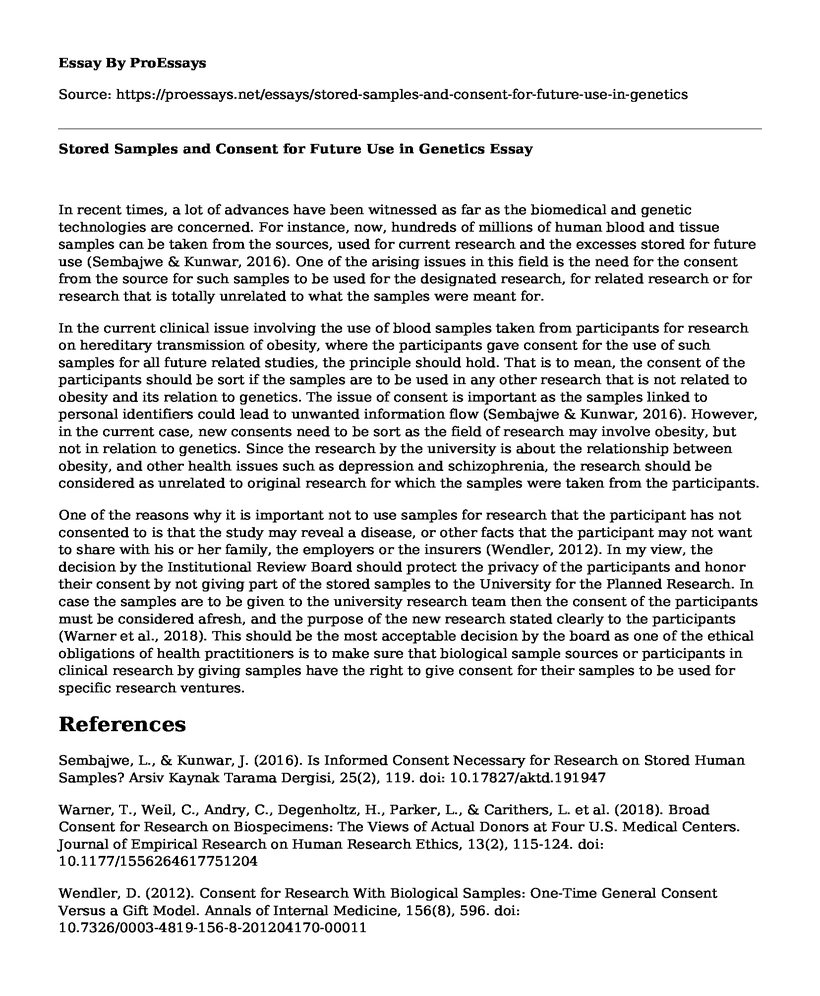In recent times, a lot of advances have been witnessed as far as the biomedical and genetic technologies are concerned. For instance, now, hundreds of millions of human blood and tissue samples can be taken from the sources, used for current research and the excesses stored for future use (Sembajwe & Kunwar, 2016). One of the arising issues in this field is the need for the consent from the source for such samples to be used for the designated research, for related research or for research that is totally unrelated to what the samples were meant for.
In the current clinical issue involving the use of blood samples taken from participants for research on hereditary transmission of obesity, where the participants gave consent for the use of such samples for all future related studies, the principle should hold. That is to mean, the consent of the participants should be sort if the samples are to be used in any other research that is not related to obesity and its relation to genetics. The issue of consent is important as the samples linked to personal identifiers could lead to unwanted information flow (Sembajwe & Kunwar, 2016). However, in the current case, new consents need to be sort as the field of research may involve obesity, but not in relation to genetics. Since the research by the university is about the relationship between obesity, and other health issues such as depression and schizophrenia, the research should be considered as unrelated to original research for which the samples were taken from the participants.
One of the reasons why it is important not to use samples for research that the participant has not consented to is that the study may reveal a disease, or other facts that the participant may not want to share with his or her family, the employers or the insurers (Wendler, 2012). In my view, the decision by the Institutional Review Board should protect the privacy of the participants and honor their consent by not giving part of the stored samples to the University for the Planned Research. In case the samples are to be given to the university research team then the consent of the participants must be considered afresh, and the purpose of the new research stated clearly to the participants (Warner et al., 2018). This should be the most acceptable decision by the board as one of the ethical obligations of health practitioners is to make sure that biological sample sources or participants in clinical research by giving samples have the right to give consent for their samples to be used for specific research ventures.
References
Sembajwe, L., & Kunwar, J. (2016). Is Informed Consent Necessary for Research on Stored Human Samples? Arsiv Kaynak Tarama Dergisi, 25(2), 119. doi: 10.17827/aktd.191947
Warner, T., Weil, C., Andry, C., Degenholtz, H., Parker, L., & Carithers, L. et al. (2018). Broad Consent for Research on Biospecimens: The Views of Actual Donors at Four U.S. Medical Centers. Journal of Empirical Research on Human Research Ethics, 13(2), 115-124. doi: 10.1177/1556264617751204
Wendler, D. (2012). Consent for Research With Biological Samples: One-Time General Consent Versus a Gift Model. Annals of Internal Medicine, 156(8), 596. doi: 10.7326/0003-4819-156-8-201204170-00011
Cite this page
Stored Samples and Consent for Future Use in Genetics. (2022, Mar 10). Retrieved from https://proessays.net/essays/stored-samples-and-consent-for-future-use-in-genetics
If you are the original author of this essay and no longer wish to have it published on the ProEssays website, please click below to request its removal:
- Eugenics and the Supreme Court Case of Buck vs. Bell
- Why Animals Should Be Excluded From Circuses Essay Example
- Essay Sample on Nature as Perceived by Man
- Essay Sample on Ergot Theory
- Compare and Contrast Humans to Animals Essay
- Should Genetically Modified Foods Be Labeled as Such?
- Essay Sample on Mountain Formation: Orogeny, Volcanism & Tectonics







